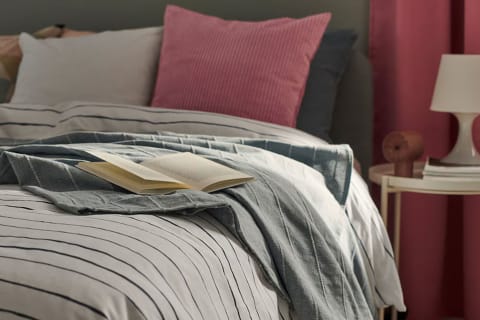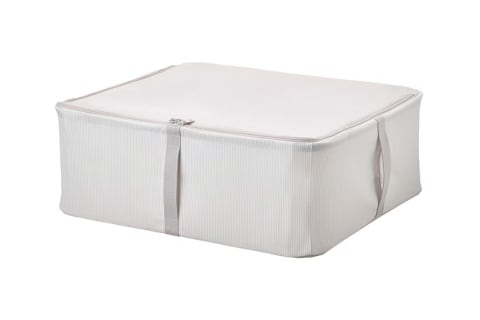Advertisement
On The Verge Of Burnout? How To Prioritize Rest Before It's Too Late

Being a high-achiever isn't easy. Between keeping up with career responsibilities, a bustling social life, and well-being goals, sometimes one key aspect gets overlooked: sleep.
Without proper rest and recovery, this constant go-go-go mentality can lead to burnout. You may be experiencing burnout if you have feelings of fatigue, brain fog, overwhelm, and even physical symptoms like back pain and muscle tension. Unfortunately, burnout is a very real problem, with most Americans saying they experienced symptoms of stress and burnout last year. Clearly, it's more important than ever that folks create space for much-needed rest.
While creating space for recovery is about carving out time, it's also about the physical space: The environments we surround ourselves in can help improve our ability to relax and, ultimately, sleep.
Research shows us that with a few small tweaks to that environment, we can better optimize the body's recovery time—and hopefully, stop burnout before it even happens.

1. Prioritize comfort and support in your physical space
Everyone needs a place to unwind at the end of the day. Crafting a comforting atmosphere will signal to your mind that you're in a safe space to relax. It will also give your body the support it needs during sleep, so you can wake up refreshed and focused.
The most important place to start is your bed, as research shows that finding the right mattress for your needs can improve sleep quality.
A literature review of 39 studies found that mattress quality and type can influence back pain1, for example.
Another study found that when researchers updated the study participants' old bedding systems (on average the beds were 9.5 years old) to new mattresses, they experienced positive overall changes to their sleep quality2—including lower perceived stress.
If a new mattress has moved to the top of your priority list, find one perfectly suited to your needs at your local Ikea store.
2. Tune out the noise
Environmental noise (things like traffic or even things happening elsewhere in the home) can impact REM cycle and cause sleep disturbances3. While we can't always control what's happening around us, there are ways to block sound from disrupting your sleep.
For example, sound-absorbing curtains can soften sounds in the home—making an environment more peaceful.
Or opt for a sleek bedroom speaker that can play a soft ambient background noise or a guided meditation to help you get in the headspace for rest.
3. Take time to "cool off" before bed
As part of the circadian rhythm, body temperatures start to lower4 leading up to sleep. Research shows that we can encourage (or hinder) this through environmental temperature.
For example, one study found that a too warm environment due to bedding and external temperatures increases wakefulness and decreases the time spent in REM5.
If you find you run warm during rest, opt for a cooling duvet and bed linens, which can help ensure you fall asleep and stay asleep.
4. Clean smarter, not harder
Research shows that a messy and cluttered bedroom can impact how long it takes to fall asleep as well as your overall sleep quality.
But sometimes cleaning itself can feel like another item on a too-long to-do list.
Find storage and bedroom furnishings from your local Ikea store that help keep your space effortlessly organized. Opt for under-the-bed storage cases to tuck away items you don't need readily available. Utilize dresser drawer slots so clothing remains neatly folded. Or get creative with hanging storage solutions, like multiuse hangers.
5. Be smart about lighting
Light is very important for optimizing circadian rhythm. For example, it's a good idea to get a few minutes of blue light in the morning6 to start the day—but in the evening, it's time to think about warm lighting7.
Warm lighting signals to the brain that it's time to rest. In the bedroom, opt for warmer-toned light bulbs and use a small bedside lamp while in bed to avoid bright overhead lighting.
And as for sleep itself—as dark as possible is best. Research shows that ambient light can affect sleep quality8, resulting in poorer memory and mood upon waking. Blackout curtains can help ensure external lighting doesn't get in the way of quality rest.
6. Prioritize clean air for sound sleep
If you're struggling with falling and staying asleep, it may come down to your internal air quality. Indoor air pollution can be a real problem, and a systematic review found that poor air quality is linked to worsened sleep quality9 in both adults and kids.
Air purifiers can help filter out indoor pollutants and allergens, helping you breathe easier throughout the night. Ikea offers sleek, compact air purifiers to improve your sleep.
The takeaway
When life gets hectic, sleep is often one area of life that doesn't get the attention it deserves. But without proper time to rest, the body and mind can't recover—leading to burnout or worse. With the right sleep essentials from Ikea, it's possible to stop burnout before it happens. Time to put a visit to your local Ikea store on that to-do list. You'll be grateful you did after a full night's rest.
9 Sources
- https://www.ncbi.nlm.nih.gov/pmc/articles/PMC8655046/
- https://www.ncbi.nlm.nih.gov/pmc/articles/PMC2697581/
- https://pubmed.ncbi.nlm.nih.gov/21203365/
- https://www.ncbi.nlm.nih.gov/pmc/articles/PMC6491889/
- https://www.ncbi.nlm.nih.gov/pmc/articles/PMC3427038/
- https://www.nature.com/articles/s41598-018-36791-5
- https://pubmed.ncbi.nlm.nih.gov/24285919/
- https://www.nature.com/articles/s41598-023-39636-y
- https://www.ncbi.nlm.nih.gov/pmc/articles/PMC7877449/












